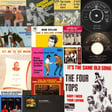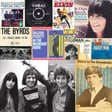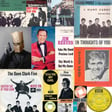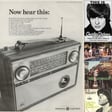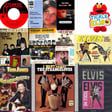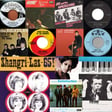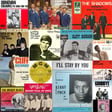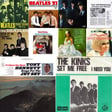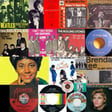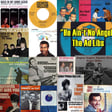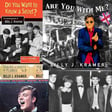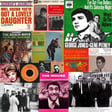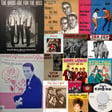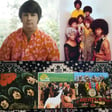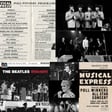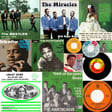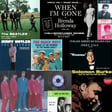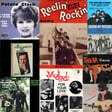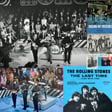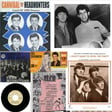Become a Creator today!Start creating today - Share your story with the world!
Start for free
00:00:00
00:00:01

September 1964 (side B)
We start in on the American charts for September 1964! The Beatles do a Carl Perkins tune. An Everly Brothers tune is resurrected, as are the Orlons! Create your podcast today! #madeonzencastr
Recommended
Transcript
The Beatles' Motivational Chant
00:00:00
Speaker
the Beatles had this chant John Paul and George and probably then Stuart and Pete had this chant when things weren't going well which in their world wasn't very often because mostly it was an upward trajectory but nonetheless sometimes you know a bad night or the gig would you know didn't work properly or the amps broke or whatever I say where are we going fellas and they'd go to the top Johnny and I say where's that fellas and they say to the top of most of the papa most I said right and we'd also Cheer up. Nothing's going to stop us now, lads. We're going straight to the top, the top-a-most of the pap-a-most.
Meet the Hosts
00:00:44
Speaker
Welcome to Side B of September 1964, the U.S. charts. I'm Ed Chin. I'm Kid O'Toole. And I'm Martin Quibbel. All right, we're jumping right in.
Chart-Topping Hits of September 5th
00:00:56
Speaker
The week ending September 5th at number one is House of the Rising Sun by the Animals. Awesome. Love that song. Classic. At number four, a song which we've mentioned, but have yet to actually talk about because by the Dave Clark Five, this is one of my favorites from the Dave Clark Five. It's a very pretty tune. Very much the good organ.
00:01:21
Speaker
Billboard would describe the song as a warmly romantic ballad that should keep the Dave Clark Five on the chart. And get ready for the Cashbox review. ah Here we go. They describe the song as a most attractive shuffle, rock-a-cha-cha beat newcomer that the artists wax in ear arresting manner. Rock-a-cha-cha.
00:01:47
Speaker
and ah Love that Well, whatever you want to call it. I agree. This is a great song It's one of those songs that you know, I hadn't heard in a while and I heard like oh,
00:02:34
Speaker
is one of those great ones. Wonderful harmonies. Nice chord changes in the chorus. And yes, good organ. This is a case where the organ actually works. Pretty lyrics. Give me one kiss and I'll be happy just to be with you. And it's simple, but it works. It's just a simple but effective song. Well sung, well played.
00:02:58
Speaker
It's just a really effective pop. I don't know if I'd call it cha-cha, but it just really has stood the test of time, I think. Yes, it sounds like 64, but I think, you know, it's earnestness and really nice chord changes and harmonies really carries the day. It's the oral equivalent of a perfumed letter. Ooh. Very nice. Very poetic ad. I like that. Okay. Oh, good. Wow. I need you to write my script.
00:03:28
Speaker
gorgeous ballad, really well played, lovely production, and do we know who wrote this?
Dave Clark Five: Band Introduction
00:03:34
Speaker
Didn't Dave Clark write it? Because was written by Dave Clark and Mike Smith. Okay, two of the members of the band. Before the questions, let me ask Dave to introduce the boys and to let you know which instruments each plays. First of all, we have Rick. He plays bass guitar. Dennis, he plays sax. Lenny plays guitar. Mike plays organ. I play drums.
00:03:57
Speaker
Now let's
Dave Clark on the Beatles' Success
00:03:58
Speaker
have some questions. One of the questions that's been asked frequently, Dave, is do you know the Beatles personally? Yes. And you do. And how do you feel about having taken away the number one spot with GLAAD all over? Oh, what? From the Beatles. Yes, right.
00:04:12
Speaker
Well, we all think the Beatles have got a great sound. They're very popular in England, and we know them personally, but it's obvious they can't stay at number one forever. I mean, they sold a million on their last record, and if it hadn't have been us that had taken over from the number one, it would have been somebody else. Mike, could you tell us if any of you write the music or the words to your songs?
00:04:34
Speaker
Well most of the songs Dave and I have written you know and I studied music for a long time and I do most of the music and Dave does most of the lyrics but on our latest album the boys have done some numbers as well. you know We mentioned Mike Smith last month as well because he's also a record producer.
00:04:53
Speaker
The history of this song is interesting. It was released originally as the B side of Can't You See That She's Mine in the UK, which is why we had mentioned this song before. However, Dave Clark insisted that because of being an A side and Epic, the US label eventually agreed. And it's a good thing they did because this would become the DC5's fifth US single to sell more than a million copies.
Julian Lennon's Musical Tribute
00:05:20
Speaker
Wow.
00:05:22
Speaker
We have a couple of cover versions, not enough for Supercut, but one of them is notable to us because, well, it is from Julian Lennon, who recorded it as part of the soundtrack for the Dave Clark Musical Time in 1986. It was released as a single in 1985, and that reached the top 40 on the UK Singles Chart, and all the way to number eight on the Belgium Singles Chart. Oh, wow.
00:05:52
Speaker
I no longer have it, but I used to have that on seven inch. Yeah, the Julian version, it's more laid back than the DC
00:06:12
Speaker
It's right, it's right.
00:06:31
Speaker
I actually would have preferred that he had applied the Phil Ramone treatment to it rather than letting Dave Clark do it. yeah The other cover, which you will hear occasionally, the Supremes recorded a version of it on the Bit of Liverpool album.
The Beatles' Chart Dominance
00:07:04
Speaker
At number eight is Hard Day's Night from The Beatles.
00:07:23
Speaker
At number nine, How Do You Do It? by Jerry and the Pacemakers. At number 12, More Beatles and I Love Her.
00:07:36
Speaker
Hang on, John's just broken a string. At number 30, Ain't She Sweet. So there's three Beatles songs. Two more coming. At number 34, I'll Cry Instead.
00:08:00
Speaker
At number 53, If I Fell.
00:08:12
Speaker
At number 55, the George Martin orchestra's version of this boy, which we have previously discussed, uh, giving you a, some extra needed cash at number 58, do I did he by Manford man, which we've covered on the UK side at number 64 from a window by Billy J Kramer and the Dakotas, which we have also covered on the UK side.
00:08:38
Speaker
At number 67, you must believe me by the impressions. I like this one a lot. It's very harmony centered. It's got some horn stabs, really nice drumming, really good guitar solo. Although it's too short. I really would have liked a bit more of
00:09:12
Speaker
Yep, well, no surprise. I love the song too. Curtis Mayfield turns in a strong but smooth lead here. Those horns, just gorgeous. The gospel tinge back up harmonies. I mean, impressions were steeped and in gospel. I love the guitar solo here. There's a bit of a callback to It's Alright in this.
00:09:32
Speaker
Could Curtis write a bad track? I don't know if it was possible for him to do that. Just fantastic. Here we go from MarvBox. A surefire smash of smooth, soulful goodness. I don't know who's doing the fantastic guitar solo. I don't know if that's Curtis or if it's one of the Funk Brothers, because I know Curtis is playing guitar on this. I'm not sure either, because the Funk
Curtis Mayfield's Guitar Mastery
00:09:58
Speaker
Brothers did do the backing track, but I couldn't find out either.
00:10:01
Speaker
Curtis is a really good lead guitarist in his own right but sometimes he used to let somebody else do the lead and he'd just play rhythm so I'm not really sure like he said. Moving on to number 72, Let It Be Me by Betty Everett and Jerry Butler. It's a cover of the Everly Brothers Tune. We'll talk a little bit ah more about the Everly Brothers Tune because well we haven't talked about it yet But this version, the two leads are great. It's kind of interesting to hear them take it in a slightly more soul direction. But I find that their harmonies and the strings take away a little bit from the tune. It's good, but I'll take the original.
00:11:09
Speaker
I do prefer the original but I do love their voices together and this was a big R and&B hit and I saw them perform this on one of those PBS specials that T.J. Lebinski does, you know, during pledge time and it was one of those 60's and I think it was 60's and 70's soul or something and they reunited Jerry Butler and Betty Everett to perform this and it's on YouTube. It was beautiful. Just blended beautifully together. I didn't think the production on this did them any favors. I thought the strings were way overdone in the beginning in particular. The recording had way too much echo.
00:11:50
Speaker
It sounded like it was recorded in a cave at various points. They deserve more. Yeah, I overall prefer the Everly Brothers version, but I thought their voices are beautiful. I've got a beddy-ism here. A bit technical. She said, the production is schlocky. And I agree. Couldn't have said it better myself. Love the voices. I just think the production didn't do them any favors.
00:12:13
Speaker
yeah I like the arrangement. It's just that the record itself is not the best, I think. It's interesting that we've got this coming straight after the song by The Impressions. They're related because Jeremy Butler worked with Curtis Mayfield quite a bit as well. I love their voices on this. I think they're great. And as I was listening, I was thinking,
00:12:33
Speaker
If you hadn't have had the orchestration there, or if it had been lower down, and you'd have had the musicians from the previous song on this, and given it an almost Otis Redding feel backing, that would have been fabulous. Absolutely. That would have really knocked this song into the stratosphere. Betty would have been much happier. And by the way, yeah, two Chicago artists in a row, hey.
00:13:01
Speaker
Now, a bit of history on the tune itself. I didn't know that it was originally a song written in French. Je t'appartaine releases a single in 1955. So the Everly Brothers recorded their version after the song was recommended to them by producer Archie Blyer.
00:13:21
Speaker
They recorded the song in December of 1959 with guitarist Howard Collins, Barry Galbraith, and Mundell Lowe, bassist Lloyd Trotman, pianist Hank Roland, and drummer Jerry Allison. There's a name we know. yeah And the song was released by cadence records as a single in nineteen sixty and it is certainly one of the big pieces of the everly brothers canon and there is no question that john and paul were listening to this record well not this record but the evers version yeah i won't be surprised if the beatles did this actually.
00:13:57
Speaker
Yeah. I'm sure they probably did. I've never heard them comment on it, but it's entirely possible. So the Everly's is a great record. This is, I think we all agree. It's at least a good record, but it could be better. Yeah, exactly.
00:14:12
Speaker
The vocalist, Betty Everett, Jerry Butler are both tremendous singers. And you can hear some of that in the record, but they kind of get drowned out in this version. Agreed. At number 73, it was on the cash box charts last month. Here it is on the billboard charts. Last kiss by J Frank Wilson and the Cavaliers. So we've covered it already, but We'll mention it just because it's here. At number 77, Knock Knock Who's There by the Orlons. Now these are not the same Orlons that we had previously heard two members of the band had left since the hit making days. I don't like this song. It sounds like the lead vocalist is trying to do a Clarence Frogman Henry ripoff.
00:15:40
Speaker
That croaking lead vocal gets old really fast. This is very corny. It's like they're trying to create a funny, danceable record. It just doesn't work. I mean, it sounds like an early 60s record from the Cameo Parkway. It's a throwaway. It's no don't hang up.
00:15:59
Speaker
This really got on my nerves. So it's a miss for me. Another one of my ah quick quippy comments. If I was two or three years old, I'd probably smile at this and then go to the next record. But I'm not. And I'm also not smiling at it. We all voted as a miss, but it's not terrible enough to make the worst of 64. I don't know.
00:16:27
Speaker
Okay. It's even too novelty for me. Other stuff we haven't mentioned, the drums are way too busy. The effects are just silly. The boing. The harmonies are okay, actually, but they're just standard girl group stuff. Right. Exactly. The only thing which stands out about this record is the guitar. It tries, but it doesn't help enough to raise it to a level of being really listenable. Exactly.
00:16:56
Speaker
so All right. You'll say it is terrible. I say it's not quite terrible, but it's definitely a miss. It is bad. I will give it that out. Bad bad song at number 79 candy to me by Eddie Holland. Good Motown backing. It's a stronger vocal from Eddie Holland. But again, whenever he takes the lead, it just shows off his limitations. Exactly. And this would be his final single. I think he wisely decided he was better as a songwriter. It's a decent record. I mean, it's not a bad record at all. I like the backing track. Obviously, Funk Brothers. I mean, the bass line is really funky. I love that. The Andantes sound like they're having a lot of fun, full of sass here. But Eddie Holland just didn't have the voice. It can't sell this. This needed a stronger voice like Marvin Gaye's.
00:17:51
Speaker
Ding, ding. Yep, exactly. I think the lyrics could have used. I hate to say this because we're talking about Eddie Holland, but I think the lyrics could have used a rewrite to to give it some kind of structure or zip, some kind of story to move the song along because it's just basically repeating the whole song. You know, she's like Candy to me. She's so sweet. I mean, it's basically that idea throughout the whole song.
00:18:16
Speaker
It just doesn't really go anywhere. And it doesn't have a memorable hook, like, where did our love go, or one of the Supremes kind of songs. I like the backing track. Andandes sound fantastic, but
Songwriting Dynamics: McCartney & Costello
00:18:46
Speaker
I think it's one of Eddie's better vocal performances, for sure. Very close to Marvin Gaye in places. that It's almost like a run through from the writer and then saying, right, I've done this. This is the guide vocal. Over to you, Marvin, to replace this.
00:19:04
Speaker
Other than that, everything was okay. The lyrics agreed. Very cliche and a bit too sweet. The best ones that they've written, there's a little bit of sweet in there, but then there's also a bit of bite, and it's almost like Eddie's got all of the sweetness in the lyrics that he writes, and he needs that bite from the other two to be able to tidy it up a bit so it's not overly saccharine. It's got more life to it.
00:19:32
Speaker
He's just saying over and over again about, oh, she's so sweet. She's like candy to me. You're waiting for some kind of punchline, some kind of story, and there's nothing there.
00:19:43
Speaker
A good comparison to me going Beatle adjacent would be it's almost like when we had Paul McCartney writing with Elvis Costello, where the beat hooks in what Paul was writing, he'd have like this hooky thing, but you needed that almost off-kilterness that Elvis Costello gave to Paul's songwriting when they wrote together. It's like it needs that thrown in there by the other two usual co-writers that he'd have.
00:20:12
Speaker
Yeah, I think that's a good analogy. Well, interesting that you mentioned that because McCartney and Costello wrote So Like Candy, which is thematically, at least somewhat similar. That's true. And a good song as well. Oh, I love that song. Love that song. And we can go all the way to the other direction and talk about, I want candy, but we won't.
00:20:34
Speaker
How many more songs can we come up with this? They have to work candy at them. Candy girl? Motown Junkies has an interesting thought, which kind of summarizes a lot of the things that we've just said. As it turned out, of course, Eddie was absolutely fed up with performing, and it's hard not to hear some of that disillusionment in this record. Quoted in the liner notes to the complete Motown singles, volume four, Holland leaves no doubt as to what a chore this record was for him.
00:21:00
Speaker
I had already made up my mind to stop performing years ago. It's just that I've always been one of those kind of people where I don't like quitting something in half stream, you know? I wanted to get two or three more hit records and then I was through with singing because I really just didn't want to do it. You can kind of hear it with this vocal. Here comes a nice palate cleanser for you all. Yes. We move on to number 81, Matchbox from the something new LP, Not the Hard Day's Night soundtrack recorded June the 1st, 1964. Now, according to the folks at Capitol, they decided on a Ringo lead vocal single because Ringo was popular. amongst the reasons they noted Cher had released the single Ringo I Love You and of course there was the Ringo for President thing. So this was the summer of 1964 and they only had three Ringo lead vocals to choose from.
00:22:03
Speaker
So obviously they're going to go with the latest one, a track off of something new, but they didn't tell radio stations which side to play. We'll get to the other side in a minute here. We all know Matchbox is a great cover of a Carl Perkins tune. It is absolutely the highlight with Ringo's doleful, sad, country tinge delivery, the guitar, the backing. It is Beatles.
00:22:33
Speaker
perfection in a lot of ways yeahp absolutely
00:23:10
Speaker
It's just rocking and Ringo's voice just fits this so well. yeah I like what you said about country tinged because of course Carl Perkins is rockabilly. Ringo would fit that so well and I love his voice on this and absolutely George Harrison puts in a great great guitar solo here. One of their best covers I think.
00:23:31
Speaker
Agreed. Always love this. I think it's a fantastic version. Great music from the fabs in the background. And then Ringo's vocal is superb. My favourite take on this is Carl Perkins' original, but I like the fact that Ringo, like you said, he has that country tinge to his voice. It's sort of almost a tribute to Carl Perkins' original vocal.
00:23:55
Speaker
hey Well, original in quotes. I mean, as we know, Carl Perkins also had antecedents about Matchbox holding my clothes. Yeah, he borrowed some of his lyrics. And of course, Carl Perkins may or may not have been there at EMI when they laid down this track. I mean, that's always an interesting story to me.
00:24:19
Speaker
So Carl says he was, and if he was in the control booth or even on the floor with them, that would have made them want to try even that little bit harder. What could have been Carl could have gone in there and there could have been three guitarists on it.
00:24:37
Speaker
At number 83, when I grow up to be a man by the Beach Boys, this is another strong offering by the Beach Boys.
Beach Boys' Recording Sessions
00:24:45
Speaker
There's a lot to like about this song. The track was recorded over two sessions in 1964 at Western Studios. The instrumental track was recorded on August 5th with a basic lineup of Ryan on piano, Carl on guitar, Al Jardine on bass, and Dennis on drums. So no wrecking crew here. This is just the Beach Boys problem.
00:25:05
Speaker
And I think this is a fascinating song in many ways because this is, I think, a preview of what they would do on PET sounds in both subject matter and the complicated song structure and the harmonics. First of all, the subject matter, you know, one of the themes that comes up again and again on Pet Sounds is about growing up and being on your own and finding love. Then in this case, he said, when I was younger, I used to worry about turning into an old square over the years.
00:25:37
Speaker
I don't think I will and that's what inspired when I grow up. Brian Wilson later talked about co-writing this with Mike Love and he said in a 2011 interview when he wrote the song he had a dismal view of his future and he was inspired about what it was going to be like to grow up. Will I like the things then as I did now? And he wrote it when he was in his early 20s. And it's just amazing to think about he wrote it from the perspective of a 13 year old thinking about what it would be like to be in his 20s. And yet he was in his 20s, you know, when he wrote the song. Well, it's very bright. exactly But I mean, it's fascinating to think about that. He would return to some of those themes on Pet Sounds, so you have that. Then you've got the jazz influences on there, and we've talked about that, of course, the four freshman influence, the harmonics on this. I mean, the harmonies are just gorgeous on this.
00:26:33
Speaker
And obviously, he would expand upon that even more on Pet Sounds. The chord changes. I mean, it's a beautiful track. Definitely getting away from Servin' USA and that kind of stuff. This is getting more introspective.
00:27:09
Speaker
This is getting into Beach Boys 2.0. We're getting an early signal of that. So beautiful, beautiful song. I'm looking forward to when we get to Pet Sound Zero Beach Boys. Like you said, it's like the Beach Boys starting to look towards writing more varied subjects. It's obviously, to my ears, more Brian lyric. And it's almost like Mike's been there to clean up a few bits where Brian's not got something or whatever, because Brian with his lyrics can be very dark.
00:27:43
Speaker
lyrically. And when he has a co-writer like Tony Astra or Van Dyke Parks, they'll lighten it slightly. You're not meaning this as a pun, but it shows them growing up as songwriters. And I love the fact that it is actually them doing the instrumentation and the playing as well, because the actual performance of the instruments is really great as well.
00:28:06
Speaker
Yes. Agreed. But I mean, lyrically, you can see the Genesis of the depression that he's going to have the equivalent of John Lennon taking all those acid trips and and wanting to get away from Cynthia that Brian just wasn't happy in his marriage at home. And you also had all the Murray Wilson stuff and you can hear all of that in the lyrics. Mike Love later said that he felt some of that was about Murray Wilson, because he was constantly challenging Brian about his manhood. So I'm i'm sure that was another inspiration. Yeah, I can definitely see a yeah a lyrical through line from this to something like in my room.
00:28:47
Speaker
Yes, for sure. And then you also have that perfectionism from Brian in the production. And you can see why as they move toward pet sounds that he would use the Beach Boys lesser and lesser playing the instruments on the album. It is said that Brian dog Dennis throughout this whole recording and that it took 37 takes wow to record the complicated rhythm.
00:29:13
Speaker
It's understandable in a sense. I remember when we were talking to shell and he was talking about when he worked with the wrecking crew and he was sort of hinting at the fact that he used Bobby Graham or Clem Coutini a lot on the drums for kink songs and other people's songs that they'd record and he said it's because he could rely on them and in essence what shell is getting out there is,
00:29:35
Speaker
that it was to avoid situations like Brian was avoiding here with the Beach Boys, or would do eventually when he'd use the wrecking crew, is avoiding that thing of, no, you've not quite got what we want, and playing it over and over and over until they get it right. And Ashel was saying, he knows that Bobby Graham on the drums would hit that mark straight away, and there wouldn't be any of that lead in there. So perhaps that's why Brian veered away later and use the wrecking crew more to do that. He felt that the Beach Boys themselves were getting fed up with Brian being so adamant about getting that perfection. Yeah, I remember seeing a documentary about Pet Sounds and you know members of the wrecking crew like Hal Blaino were interviewed and they seemed way more on Brian Wilson's
Brian Wilson's Perfectionism & The Wrecking Crew
00:30:26
Speaker
wavelength. They seemed to really understand the perfectionism and working with them in the technical aspects of it. So that may be true, Mark.
00:30:34
Speaker
Yeah, here's a bit of a description. Special attention was bought to the drum pattern to avoid a traditional backbeat rhythm common to rock and roll songs of this era. Instead, it effectively plays around the vocals with interesting fills, adding texture and drama to the passing of time in the lyrics. Each part of the drum kit works independently from each other, horizontally as four separate parts, rather than a whole set working together.
00:31:02
Speaker
That's something you might not have thought of, but when you hear that and then you go back and listen to those drums, the drums really are unique on this song. That's very true. I love this. Good old Cashbox describes the song as being in jumping rhythmic manner that has made Beach Boys such big teen favorites. Jumping rhythmic manner. I need to up my game.
00:31:28
Speaker
So despite all that, I like the song. It's probably not amongst the favorites of the Beach Boys canon for me, but I do like it. I didn't like it when I first started listening to the Beach Boys, but over the years, I've really gotten to appreciate it a lot more for its sophistication. At number 88, Mercy Mercy by Don Covey and the Good Timers. I said I give this damn baby Tell you what I'm gonna do
00:32:18
Speaker
It's a good saw backing. It's got great guitar and drums for a reason we will explain shortly here. Good vocals, although I don't really love Don Covey's lead and I would have liked a bit more pleading in that lead vocal. And we will get to what makes this record special shortly. Indeed. I like this song. It seems very Curtis Mayfield influenced.
00:32:39
Speaker
with prominent guitar. I like the lead vocal. It's confident but laid back. And yes, maybe it could be a little more aggressive. But the song, for a reason that we're going to get to in a minute that you were alluding to there, and is credited for shaping Future Soul because of its guitar-centered backing.
00:33:01
Speaker
Before that, Soul was really more horn-based, but this song really established a more guitar-centered, dominated Soul sound. And it really has been credited with changing the sound of Soul, transforming it a bit. So this record is fairly significant, and it's been covered a number of times as well.
00:33:26
Speaker
yep Cool song. I absolutely loved it. And now I realize why I love the guitar so much on this song. So we have been dancing around it. We now know that this was amongst the very first recordings in a recording studio that Jimi Hendrix did.
Jimi Hendrix's Studio Milestone
00:33:48
Speaker
Yep. How about that? Wow.
00:34:20
Speaker
So there is a story from Curtis Knight. Jimmy and I all used to live in the same apartment building around 81st street near the A1 studios. One day Don Covey came around shopping for a record deal. He used to go down to the Harlem clubs looking for somebody to use on songs that he was looking to sell to Atlantic records. He'd say, Hey, I got this tune. I want you to help me with it. Come on down to the studio. Can you see this part? Can you play this part? And that was then how he got Jimmy. on the record yep and it turns out that jimmy performed this uh several times live in his shows thank you very much we'll have to continue on with a little tune very straight top 40 rmb rock and
00:36:13
Speaker
Even before the single was released, ah Steve Cropper, who of course we all know the great guitarist Booker T in the MG's, said he recalled meeting Jimi Hendrix at Stax Studios in Memphis in 1964 and he mentioned that he had played on this record. And Cropper said, that about knocked me to my knees because that was one of my favorite records at the time. I hadn't worked with Don Covey yet, but I asked Jimmy to show me that great lick he played. Later, Jimmy took my guitar and started playing that sucker upside down. Cropper played right-handed guitar while Hendricks played left-handed. I laughed and told him, I can't learn that lick by looking at it that way.
00:36:58
Speaker
and that Cropper's memory was backed up by a 1968 Rolling Stone interview that Hendrix did. Hendrix said, he, Cropper, showed me how to play lots of things and I showed him how I played Have Mercy or something like that. And then it goes on that, yeah, he played the song Mercy Mercy on occasions on stage. So pretty cool. Very cool.
00:37:26
Speaker
And we can mention the other members of the Good Timers on this record. They included guitarist Ronald Alonzo Miller, who might also have been the bassist, backup singer George King Clemens, Horace Ace Hall, Horace Ace Hall, yes and drummer Bernard Purdy.
00:37:46
Speaker
Pretty Pretty. Also, possibly Bob Bushnell and Jimmy Johnson. so Quite a group. The Stones would cover this song in 1965 for their album, Out of Our Heads, a good version, but not as good as the original, even though I'm not a wild fan of the original. But as I said, it's a significant record, obviously, for Jimi Hendrix, but also because it is more of a guitar centered soul record, which was fairly new for the time.
Transforming Motown to Rock
00:38:21
Speaker
So I was watching a documentary about Danny Korchmar and crew. And one of the things they actually say in there is that what they got from the early Beatles stuff is that that was turning horn based
00:38:35
Speaker
Motown style songs into rock and roll guitar bass songs. So very much the same kind of thing you're saying here. Hi, I'm Curtis Knight. For those of you who don't recognize the name, I was fortunate enough to have discovered, played with, and been a very close friend of Jimi Hendrix.
00:38:59
Speaker
It was perhaps one of the most enlightening times of my life. I stood next to a genius and it's something that I can never forget. I remember the first time I saw Jimmy was on 47th Street, New York City at a place called the Hotel America, which is now a parking lot.
00:39:20
Speaker
In the lobby of the hotel they had a recording studio and I stopped by there one day and I had some music business to attend to. And standing by the elevator I saw the most incredible looking guy that I had ever seen in my life. This guy had hair out of here.
00:39:37
Speaker
Now we were talking 1964. Now I'd seen some strange things, but I said to myself, this must be a very special person. So I walked up to him and said, hi, I'm Curtis Knight, what's your name?
00:39:52
Speaker
what do you do He said, my name is Jimi Hendrix and I play guitar, but I don't have one because I just came off the road playing a soul tour and I had to pawn the guitar, I got tired of the soul tour, playing in the key of C and G, and I pawned the guitar, and if they catch me down in the lobby they're going to put a key in my room and I won't be able to get back in. I told him, I said, look, I have A guitar out in the back of the car and an amplifier. I had a Fender Super Reverb and a Fender Strat. I said, go back up to your room so they don't so you don't get locked out. So I went out, I got the guitar and amplifier, took it up to his room, he picked up the guitar, turned it upside down because he's left handed, and what I heard almost blew me off the door with an atomic blast. I had never in my life heard anyone articulate
00:40:44
Speaker
play chords and lead at the same time was totally blown away. Moving on, number 89, hold me by PJ Proby, which we've already covered on the UK side. At number 90, there's Frank again, softly as I leave you by Frank Sinatra.
00:41:04
Speaker
i
00:41:34
Speaker
It's a great Sinatra vocal, but the rest of the song I'm not a big fan of. I don't really like the strings. I don't really like the background singers. The rest of the backing is just kind of plinky plinky. The piano is nice, but the vocal is the only thing that saves this record from falling into easy listening territory. And I don't like the kettle drums and the big ending. Yeah, I have to agree.
00:42:20
Speaker
vocal is great. I mean, it's Sinatra, what do you expect? But I don't like the production on this. The strings are way overdone. The chorus, the backing singers, I don't really care for. This is interesting. I found out that this was part of an album that was arranged by Ernie Freeman, who also did songs on this one then suddenly love and available and it really departed from his signature vocal jazz style and went with a more contemporary pop sound. And it was really ah kind of mimicking the chart success that Dean Martin had with everybody loves somebody using more of a driving beat heavy strings and choral tracks. And I don't think that really suited
00:43:09
Speaker
Frank. That's just not his strength. I think his strength is more the vocal jazz style. And so, yeah, nice vocal. But he didn't need to mimic Dean Martin's style. He had his own sound. So I didn't care for this either. The arrangement didn't suit him.
00:43:28
Speaker
also one of my least favourite albums by Frank. Let's see if I can do this without getting tongue tied. Great vocal, but it is not the cream of the crop from this once crowned king of the crooners. Ooh, very nice!
00:43:43
Speaker
There you go. This song was another foreign language song. It was originally entitled piano and was a single in 1960. English songwriter, How Shaper noticed the song and in November of 1961 wrote English lyrics to the melody, changing it to this title. There are a couple of cover versions that should be noted. There's a really weird Elvis cover version of this song where Elvis is not doing the singing. He's just kind of doing the talky-chanty bit of the lyrics in front of a singer. That's weird. Now, this next song, Ladies and Gentlemen, what I could do is a ah song we've been doing a lot here, and it's a true story. And I'd like to share the story with you. The song has been around for a long time, but there's a story behind it and I'd like to share it with you. It's a story of a man
00:44:40
Speaker
He was in a hospital and he's dying. And his wife has been sitting by his bedside for three days and three nights. Somewhere in the third day, between midnight and day, she let him beside him and dosed off to sleep. Well, he felt her when she dosed off to sleep. And at the same time, he felt himself start to die. So he didn't want her to see him.
00:45:09
Speaker
pass away. So he took his notepad from the side of the bed and he wrote, softly, I believe,
00:45:47
Speaker
Okay. That's interesting. How is this entertaining, Elvis? Inspiration for William Shatner there, maybe. Matt Monroe did a version of this song. George Martin produced it. It's much more tasteful backing, and the Monroe vocal was also very good, although it's not in a league with Franks. Take Frank Sinatra's vocal from this and put it with the George Martin backing. More work for Peter Jackson and Mal. There you go. At number 96, the next one from Roger Miller. Chug-a-lug.
00:46:22
Speaker
How did they get away with writing these sorts of lyrics in the early sixties? This is a song about underage kids going out and getting excessively bombed. It's the early sixties, Ed. It was a different time. Wait till we get to the 1970s and you get the song in the summertime by Mungo General. Yeah, that's right.
00:46:50
Speaker
which tells you she to go and get drunk and then go and drive a car. Yeah, that's right. We have a new contender for a compilation album. This very definitely has that Sesame Street opening to it. Yeah.
00:47:06
Speaker
jugglelu
00:47:32
Speaker
a very popular chord structure back then. You know, as I heard it, I'm like, oh, yes, I've heard this. It's stupid, but it's kind of funny. It's a novelty song. And it was a hit. Reach number nine on the Billboard chart. And it It was also a top 10 hit on the country chart. It's stupid, it's silly, but for what it is, it's kind of fun. Believe it or not, it was based on the true story of a friend who he said could drink a beer in three seconds.
00:48:05
Speaker
it And he did not want it to be released as a single. It wasn't his idea. But the head of Smash Records, Charles Fox, said that it should be released as a single because he said the college crowd was eating up this song and also country fans like it. And so, of course, they released it and it was a big hit. So there you go.
00:48:31
Speaker
Why did they never use this in the film Animal? Yeah. There you go. Chug a lug, chug a lug. Makes you want to holler hidey ho. Burns your tummy, don't you know? It's about moonshine. There you go, John Belushi. You need to go in there, find that guitar, and you know what to do with it. That's right. Yeah, it's silly novelty for students who like to go out and drink far too much beer and have a laugh.
00:49:00
Speaker
but Good summary. The Swinging Blue Jeans would cover the song in 1966 on their album, Don't Make Me Over. It's very weird to hear British folks trying to do the Roger Miller singing style. Oh, I'm really looking forward to hearing that.
00:49:28
Speaker
make you want to holla high
00:49:39
Speaker
In 1992, Mojo Nixon did a version of the song and Toby Keith did another one in 2010. Now my favorite note about this song in the early 2000s, this was reworked in several different rap versions.
00:50:27
Speaker
Not really rap, but rap adjacent versions as a commercial and it was entitled milk chug for single serving milk bottles.
00:50:39
Speaker
oh okay When you set a rap version, I was expecting Jay-Z to suddenly appear on a supercoat.
00:50:50
Speaker
At number 98, I want to thank you by the Enchanters. Good lead vocal, good backing vocals, really smooth instrumentation, great horns, really great guitar line. It's not the most original songs, but it has enough touches that points it forward that even though it's kind of a throwback, it's not that much of a throwback.
00:51:11
Speaker
Yeah, I agree. And what's interesting to note here is that the enchanters were originally, you know, led and, of course, he has come up many times on our show by Garnet Mims. But by this time, he had left the group and it was by this time led by Sam Bell and the female voice was Zola Parnell. They had signed with Warner Brothers and They were trying to make headway without Garnet Mims. Unfortunately, they didn't do as well without him. But yeah, this is a kind of a good old-fashioned soul record. And yeah, I think that the enthusiasm is great, as you said. We should have been recorded better. But yeah, love the horns, the arrangement. It's the singers, as you said, that really shine here.
00:52:04
Speaker
Yep. Sensational, soulful sound that's satisfying. Marv is going for alliteration this week. Yes. Wobbit. I am. Yes. Good arrangement, lovely vocals, and I really enjoyed this. Nice.
00:52:20
Speaker
At number 99, another amazing song from The
John Lennon's Vocal Brilliance on 'Slow Down'
00:52:25
Speaker
Beatles. Not that all of them aren't, but this one in particular, Slow Down, their cover of the Larry Williams tune from the Something New LP recorded June the 19th, 1964. John Lennon's vocal, it rivals his twist and shout vocal to me.
00:53:10
Speaker
I love this. Yeah, this is definitely one of John's finest rock performances. It's just got that grit, you know, and it also shows just how indebted the Beatles were to R and&B and they could cover R and&B like few other groups.
00:53:27
Speaker
at the time. I mean, they just ripped it. And as you said, as good as his twist and shout vocal, the scream that he does, ah and the guitar solo George turns in. I just can't say enough. This is one of my favorites by Beatles. Awesome. Incredible rock vocal by John. Great backing music. I will single out George Martin. I'd really like what he's doing on the piano in the background. Good call.
00:53:52
Speaker
is just they're providing a really good bed for them to play around and to be able to just do what they do. But yeah, I love what George does there on the piano. Yeah, I agree. yeah And I like how you said of providing a bed. He's doing kind of a tame version of Jerry Lee Lewis, just that kind of old fashioned rock and roll 50s, a little bit piano and oh, it's so good.
00:54:13
Speaker
I described this song as the perfect turn it up and put your foot on the accelerator song. It's not a Beach Boys car song, but it's one that makes you want to drive and drive fast. Yeah. Now, a little note on this. So we got the single. We got Mashbox and Slow Down. Those are two of the longer songs on the something new album. The combined length of those two songs is four minutes and 53 seconds.
00:54:40
Speaker
All of side A of something new is only 14 minutes and three seconds. Wow. So we've got more than a third of side A of something new and 19.2% of the entire LP. Cheers. Okay. We close out this week with our old friends, the Riviera's and their cover of rock and Robin.
00:55:33
Speaker
The opening guitar is not great. The lead vocal is kind of rocking, no pun intended, but it's at least a bit herky-jerky and ever so slightly ah mediocre buddy Holly ripoff. The guitar solo is good, but it gets a little bit repetitive. The wolf whistle at the end is what takes it over into missed territory.
00:56:14
Speaker
I'm sure Kit will have something to say about the organ. Yes, I do. It's not terrible. It's not the worst I've heard, but definitely not great. I mean, Rockin' Robin does not need organ. Come on. And the change of lyrics to try to make it kind of surfy.
00:56:31
Speaker
I just didn't care for that. Changing the lyrics referring to Frisco Bay because it's Riviera's because it's California Sun. They had to make it to California, you know dropping the California hint. So come on, you don't need to change the lyrics to Rockin Robin. I mean, the guitar solo was okay. I was waiting for him to really go into some kind of rockin' solo, but it never really happened. It was just really restrained. Just a pretty boring solo. This just can't compare to the Bobby Day version. Or even the Michael Jackson version, which is actually the first version I ever heard when I was growing up. Very average lead vocal, and as you said Ed, trying to sort of emulate Buddy Holly. And I'm going to close this with one more Betty-ism. Corny!
00:57:21
Speaker
It's just kind of corny. Didn't care for this. It's like the first run-through of them trying to get the song, failing to remember the lyrics properly, so making their own up, and attempting but not quite getting the sound that Dwayne Eddy was getting on the guitar. yeah So we all market it as a myth.
00:57:44
Speaker
Yes. So once again, as a palate cleanser to a bad version of a great song, we are going to have a super cut here. Some of the covers and versions included the Bobby Day original, Cliff Richard, the Hollies, Ian and the Zodiacs, Gene Vincent, Freddie Cannon, Shana, the Michael Jackson version, of course. Yay. Taj Mahal and Bobby V. Oh boy.
00:58:13
Speaker
You now have great pleasure in welcoming to the
01:01:07
Speaker
All right, that was side be the first week of the American charts. We will be back with more real soon. See you then.
01:01:18
Speaker
Take care.
01:01:36
Speaker
There was a piece in the NME, a news piece, that said that Top Rank Records, remember when Top Rank had a record label? and They introduced an LP series next week that will be called Toppamos.
01:01:48
Speaker
And it's coinciding with their current advertising slogan, topper most of the popper most. They got it from somewhere. They saw that. They must have seen that in either the NMA or record mirror or disc.
01:02:02
Speaker
record in show mirror as it was then and they've taken it from there they've obviously thought how stupid that is how stupid is it's one of those phrases that someone an older person who doesn't understand teenagers comes up with a slogan that they think is going to be the hip slogan of the month.
01:02:19
Speaker
top of most of the poppermo
